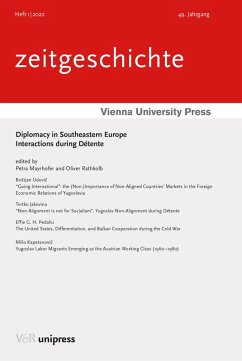
To Help or Not to Help - Humanitarianism in the 20th Century (eBook, PDF)
Sofort per Download lieferbar
Statt: 25,00 €**
23,00 €
inkl. MwSt. und vom Verlag festgesetzt.
**Preis der gedruckten Ausgabe (Broschiertes Buch)
Alle Infos zum eBook verschenkenWeitere Ausgaben:

PAYBACK Punkte
0 °P sammeln!
Today, humanitarianism, as a moral imperative to help, is prevalent, especially in the so-called Western world. The public reacts to natural disasters, war, or medical emergencies with a desire to alleviate suffering. But in recent decades historians have begun to critically assess this moral perspective and examine humanitarian organizations, politics, and the motives of humanitarian actors. They highlight how helping people relieve their suffering is just one side to every humanitarian story. Humanitarian actors themselves have their own reasons for helping. Humanitarian aid evolves in a ten...
Today, humanitarianism, as a moral imperative to help, is prevalent, especially in the so-called Western world. The public reacts to natural disasters, war, or medical emergencies with a desire to alleviate suffering. But in recent decades historians have begun to critically assess this moral perspective and examine humanitarian organizations, politics, and the motives of humanitarian actors. They highlight how helping people relieve their suffering is just one side to every humanitarian story. Humanitarian actors themselves have their own reasons for helping. Humanitarian aid evolves in a tense dialectic between people in need and the individual agendas of the 'benevolent saviors.' This special issue approaches humanitarianism and humanitarian aid from the perspective of such 'benevolent saviors' and their agendas and covers different moments in history and geographical regions in the 20th century. The papers analyze humanitarianism as a reconstruction mission according to civilizing desires, as an enabling factor for individual professionalization, as a power struggle, and as a tool for domestic and international policymaking.
Dieser Download kann aus rechtlichen Gründen nur mit Rechnungsadresse in A, B, BG, CY, CZ, D, DK, EW, E, FIN, F, GR, H, IRL, I, LT, L, LR, M, NL, PL, P, R, S, SLO, SK ausgeliefert werden.













